Mock Newbery Finalist: ATTACK OF THE BLACK RECTANGLES by Amy Sarig King
Introduction by Heavy Medal Award Committee Member Janee Jackson-Doering
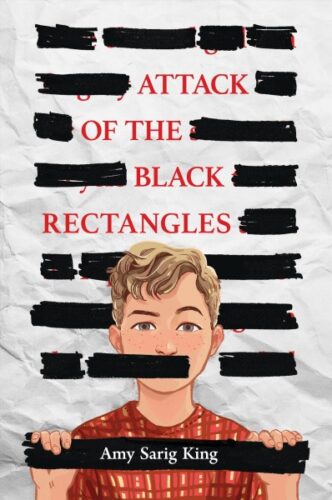
“I am here to protect all of us from the ugly world.” Laura Samuel Sett, Sixth Grade Teacher
In the world of Amy Sarig King’s novel, ATTACK OF THE BLACK RECTANGLES, adults like Ms. Sett write letters to the newspaper and enact laws on everything to keep their “perfect” town safe. No Halloween celebrations. No junk food. Even thinking “bad things” is a problem.
Sixth Grader Mac Delaney has ignored all the town’s rules. He’s a free-thinking kid who’s been raised by his mom and Grandad to call out things that are wrong. At the elementary school, Mac and his friends, Marci and Denis, are assigned to read The Devil’s Arithmetic by Jane Yolen. There’s only one problem: black rectangles are drawn around certain words in the book. Once the kids see this, they visit the bookstore and grab a copy to read the omitted words: breast, undeveloped chest. Feeling violated, the three kids suspect Ms. Sett drew the rectangles – and they intend to right this wrong.
ADVERTISEMENT
ADVERTISEMENT
ATTACK OF THE BLACK RECTANGLES is more than just a book about censorship. It’s about kids taking a stand by protesting, speaking at the school board meeting, and voicing their frustrations.
It’s about Mac understanding his unreliable father’s erratic behavior is a result of mental illness – and coming to terms that he’s not the father Mac needs him to be.
It shows how Tweens feel when well-meaning grownups – like Principal McKenny – dismiss their valid concerns not just because they’re children – but because the grownups know something is wrong and they’re forced to actually do something about it. Or not. When Mac, Marci and Denis report to McKenny their copies of The Devil’s Arithmetic are censored, she checks into it. However, she doesn’t replace the copies Ms. Sett distributed and doesn’t resolve the problem.
It’s about intellectual freedom, tolerance/intolerance, finding grace in uncomfortable situations and finding out who you are.
I loved how Mac, Denis and Marci stood up for intellectual freedom. These kids are smart, resilient, and relatable. I adored Mac’s hip, meditating Grandad, Marcus – who reveals to Mac that he fought in the Vietnam War, killed two men, and struggles with the shame of that decision (pg. 187).
ATTACK OF THE BLACK RECTANGLES shows readers that there are ugly truths about our world. Yet, like Mac and his friends, you can face those truths and hopefully, change the status quo.
Mac says, “What happens next, if we let it happen, is the truth sets us free. Even if it makes us uncomfortable or sad. It’s still better to know the truth than it is to be lied to.” (pg. 257)
Strong characters and excellence in presentation of themes make ATTACK OF THE BLACK RECTANGLES a worthy Newbery Medal contender.
Heavy Medal Award Committee members and others are now invited to discuss this book further in the Comments section below. Please start with positive observations first; stick to positives until at least three comments have been posted or we reach 1:00 pm EST. Let the Mock Newbery discussion begin!
Filed under: Book Discussion, Heavy Medal Mock
About Steven Engelfried
Steven Engelfried was the Library Services Manager at the Wilsonville Public Library in Oregon until he retired in 2022 after 35 years as a full-time librarian. He served on the 2010 Newbery committee, chaired the 2013 Newbery Committee, and also served on the 2002 Caldecott committee. You can reach him at sengelfried@yahoo.com.
ADVERTISEMENT
ADVERTISEMENT
SLJ Blog Network
The Moral Dilemma of THE MONSTER AT THE END OF THIS BOOK
Cover Reveal and Q&A: The One and Only Googoosh with Azadeh Westergaard
Winnie-The-Pooh | Review
Parsing Religion in Public Schools
ADVERTISEMENT



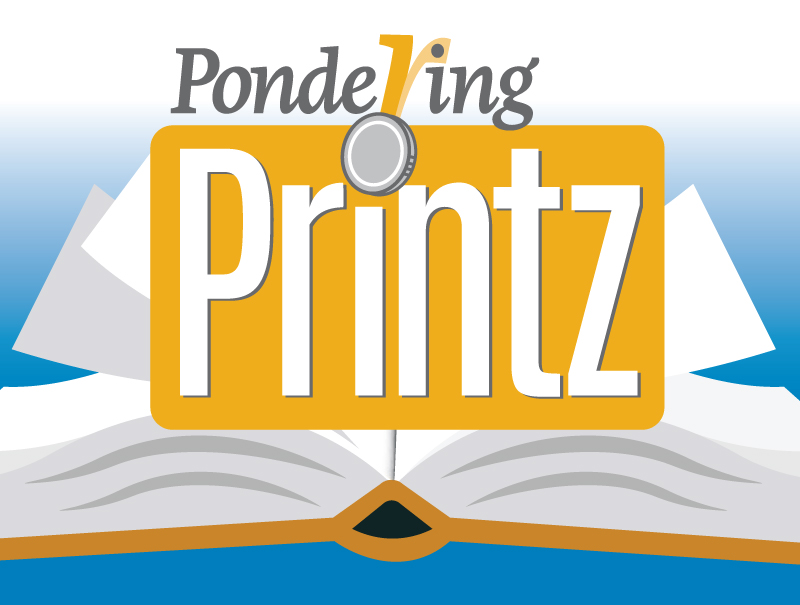
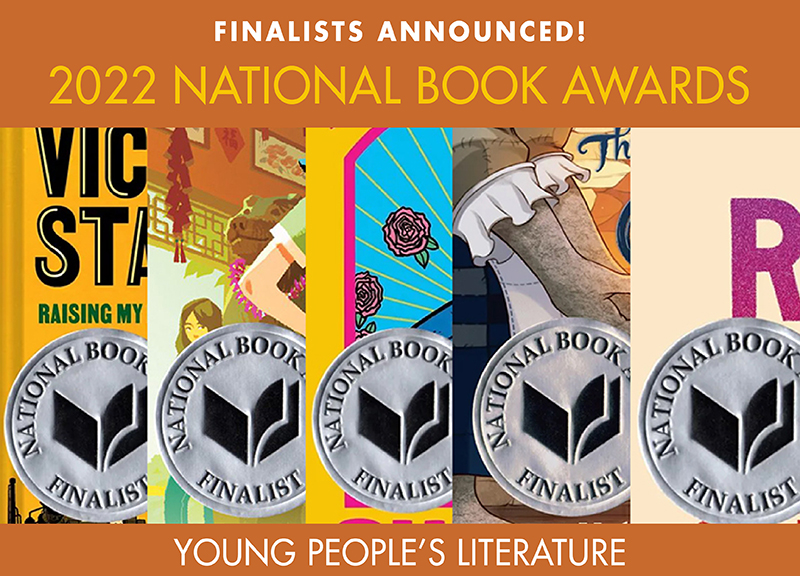
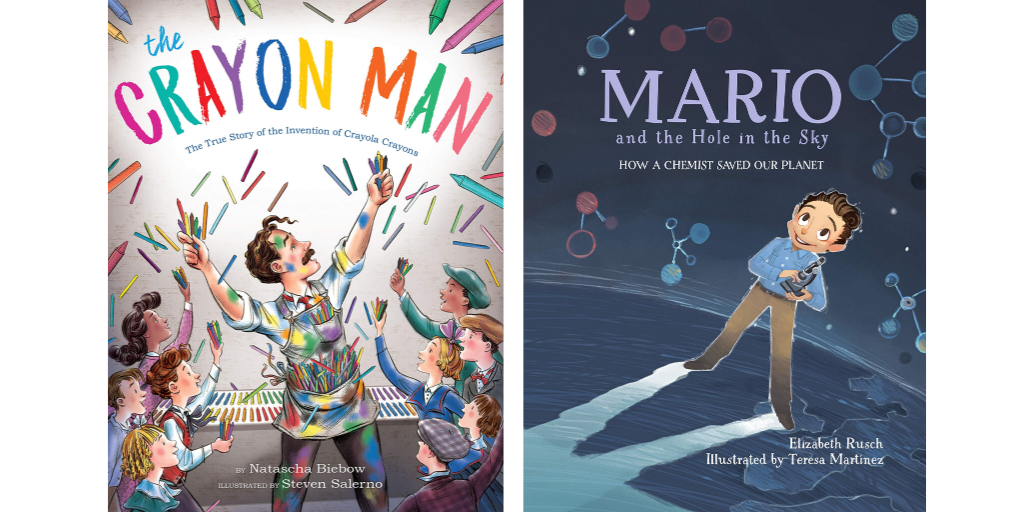
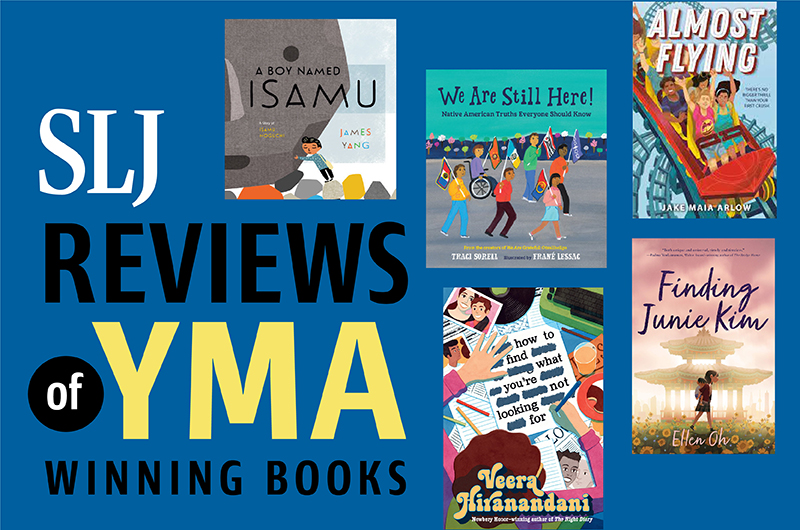
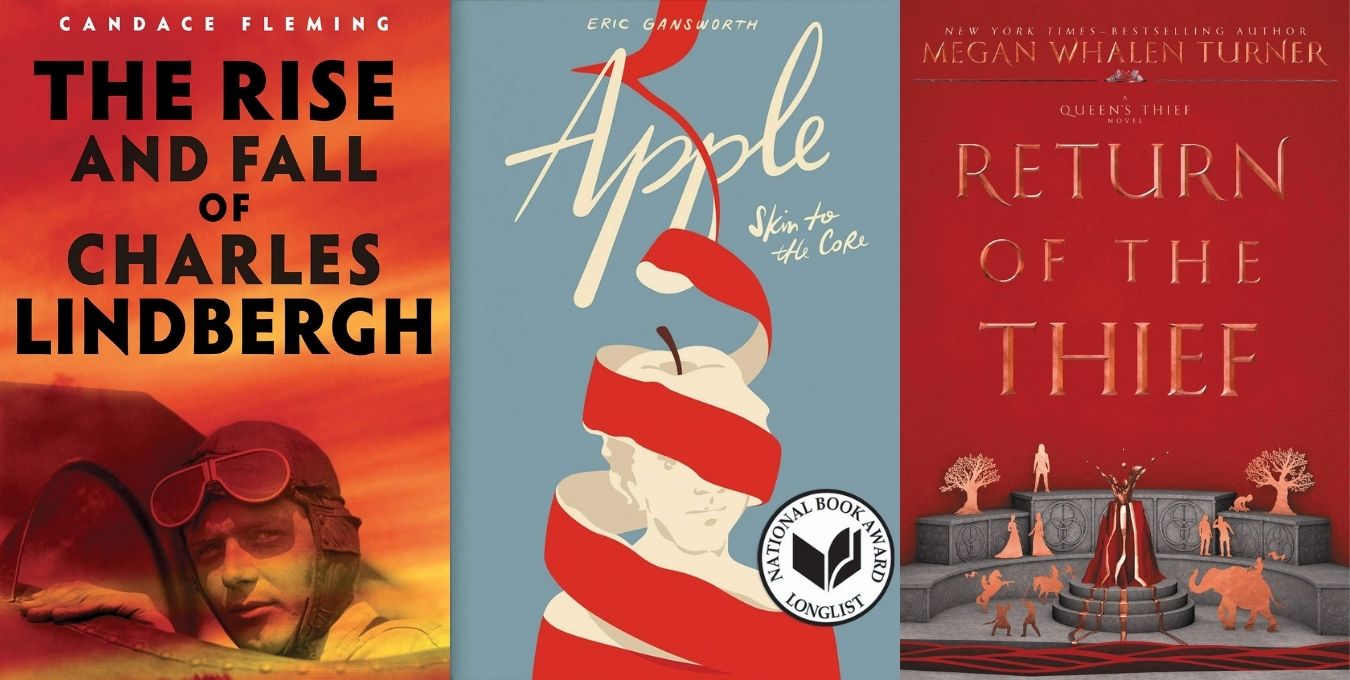
An incredibly timely book! I reviewed this for Booklist and it was a starred read for me not just because of the timeliness, but because of how real Mac felt to me–his anger, his struggles, his frustrations, his emotional release, etc. Very tween! The appearance of Yolen at the end had me crying! The overarching theme here is the strongest element, but the characterization is also high–with Mac, and especially the strict teacher!
I loved this book. It’s extremely relevant to current events, very well written, and has well rounded characters who all have something to offer. I reviewed it for The Sydney Taylor Shmooze mock award blog on 9/11/22.
Janee-Great write-up. I too loved the message that tweens can stand up and make a difference. It is what the world needs and middle-schoolers need. I loved that it brought awareness to a topic that is playing out in a big way all over the country. The theme of censorship and student activism is well done. I also liked the theme of family as Mac and his Mom and his grandad are supportive and loving especially as Mac struggles with a Dad who is not present for him. However, some of the dialogue just felt forced and didn’t feel like what a kid might say. The message is good but I felt it was delivered in an over the top preachy way. I know that the author based this on a true occurrence but I can’t help but feel the dialogue should have been a bit more authentic to how middle-schoolers speak.
I think this book delivers an important message and I liked that King gave Mac the power to stand up and affect change through a caring Mom and Grandpa, who were both great characters. But realistic fiction needs to be realistic to the reader. I couldn’t get past the fact that Mac was supposed to have believed that he was flying over his neighborhood when his dad had him out driving around in a car at night. I just didn’t buy it. In general, I didn’t find Mac believable through his actions nor through his dialogue.
Maybe more bothersome to me was Mac’s dad thinking that he was an alien and no one discussing his mental health, and no one discussing the implications for Mac or discussing with Mac the fact that his dad thought he was an alien. I kept waiting for it to be addressed by his otherwise caring mom and it never was. I never really understood the mom and dad’s relationship. Were they taking a break or was it over? Why wasn’t she concerned that her child’s father thought he was an alien? (Or was it a joke and I misread it?)
This one missed the mark for me. It seemed preachy, too, but I think probably because it didn’t ring true for me.
Maura, I think the extent of Mac’s dad’s mental illness wasn’t apparent to Mac’s mom and grandpa until he told them about the late-night drives/flights and some of the things his dad was telling him – at least, that’s how I read it, but maybe I missed something. It also seems like his dad’s behavior escalated during the course of the book – from the smashed mug to the thefts – and in the end he did seem to be getting some kind of care.
I’m not sure if this comparison works, but if Aviva can believe that a dybbuk is responsible for some of her own actions, maybe it’s not too much of a stretch that Mac believes in late-night flights with his dad? He might have really WANTED to believe – it’s his dad, after all. As adult readers, we can see pretty clearly that something is wrong, but Mac doesn’t have our same view.
Also, if you’ve read any other A.S. King, this is pretty restrained – nearly all of her books have some kind of borderline magical realism. It’s definitely not for every reader, and requires a willing suspension of disbelief. It seems like this book didn’t work for you for a few reasons, though, not just the alien stuff.
Maura, I agree that this book delivers an important message about censorship and how King gave Mac the power to stand up and affect change through supportive friends and a loving mom and grandad. But I also had the same questions about Mac’s dad’s mental illness that you did and I kept waiting for it to be addressed by Mac’s mother.
I felt that Mac’s mom’s attitude about grace was unhealthy for both herself and Mac. Grace for her was unconditional (p. 10), she trusted people even when she shouldn’t (p. 124), and she let Mac’s dad continually back into their lives and cooked for him even when he was a jerk to her (p.143, 218). This attitude had an affect on Mac’s thinking about grace (p. 11), and how he should tolerate his relationship with his das at times when he didn’t really want to.
Anyway, I really wanted the main theme to be about standing up to censorship, but I got distracted by Mac’s dad’s mental illness and the affect it had on Mac’s family.
I agree with you Maura. I was actually really hoping that it would turn out that Mac’s dad was an actual alien and they really were flying to make this book more magical realism. When I realized that wasn’t the direction the book was taking I was as confused as you were as to how Mac really believed that was what was happening.
I do think this book is very timely and I did really like the characters but it felt a little heavy-handed in places.
I loved everything about Attack of the Black Rectangles. The main message is about how much is lost when books are banned, how wrong banning is when truths are hidden from children. Mac’s just a kid. Such a preteen that he doesn’t understand ‘mental health issues’ and all he wants is that his family could be a normal one. Who can blame him for accepting his weird, angry dad on his terms, until he just… can’t any longer. But about the truths of the Holocaust, and the need and the right for kids to KNOW those bad truths, not have them hidden from kids his age. The Holocaust affected people, teens like himself, their bodies… that’s something Mac ‘gets.’ And he will not be deterred; we insists that his peers know the truths. When I reached the point in the plot where Jane Yolen’s magnificent book was cemented into King’s plot, I could hardly breathe with the creative way King infused it to hit its mark with today’s tweens. And I cried for the tweens today who are trying to grasp the horror of the Holocaust through books of all sorts, whether they are graphic novels or memoirs or part of realistic fiction read as King presents here, hidden-like-a-secret-gift. I daresay that a clever teacher will nicely pair Yolen’s, The Devil’s Arithmetic, with King’s book.
I’m always eager for a new A.S. King book, and this topic is so timely. Naturally it reminded me of BAN THIS BOOK by Alan Gratz, but this one played out in a different way.
Others have already mentioned the strong themes: the importance of truth and the wrongness of censorship, the importance of standing up for what is right, the importance of family and friendship. I loved what Jane Yolen said when she showed up at the board meeting, that when she learned about the Holocaust at age 7, she was horrified (of course), but also relieved, because she knew the grown-ups around her were telling the truth. Mac echoes this toward the end, in the section called “What Happens Next”: “It’s still better to know the truth than to be lied to.”
Mac (and Marci and Denis) all have adults in their lives who they can trust and some they can’t, and are learning to tell the difference. “I’m done hoping adults do the right thing. I’m done thinking they have our best interests at heart” is a real tween/coming-of-age sentiment, and Mac and his friends pair it with action. I agree, Kate, that Mac is a pretty evolved 12-year-old and the dialogue doesn’t represent how most 12-year-olds talk. Then again, John Green’s characters don’t necessarily represent how most teens talk, either, and those books are still beloved and acclaimed.
Lastly, I appreciate the complexity of Ms. Sett’s character; she censors her books and that is wrong, but she isn’t a textbook villain. I wanted to know more about her, and how she developed her strong opinions and positions. (I doubt most tween readers would share this curiosity – but maybe?)
I’m living in a state where literally people are doing this….so ATTACK hit me in all the feels.
However, I do feel it came across as slightly preachy and this is from someone who enjoyed the book. I was comparing it to OGRESS which, to me, is more lyrical and subtle in tone, but more beautifully written and conveyed. Is that fair of me to say?
There were many parts of this book I thought were really well done, but I was confused about Mac believing that his Dad turned his car into a plane. I thought he was humoring his Dad and was surprised at how crushed he was to realized his Dad was just driving. I had to go back and reread a few parts.
I appreciated how the author showed how a family with different beliefs (Aaron and his Dad) can find common ground. “I am pretty sure that guy and I don’t vote for the same people but we think the same about our kids.” I can see that being a great point to discuss with students.
Thanks for the great intro! I thought that this was a fantastic book and I agree with others that it is so prescient. I wish it could be required reading for everyone. It shows the power of community and the voices of children to be heard and listened to with respect. This is a book that students will find a strong connection to and I hope it will inspire not only them, but also the adults in their lives.
In terms of Newbery criteria what stood out the most for me was character delineation. I though each character was written with such a strong voice and I truly felt like I knew them by the end of the book. I always love when an author writes an antagonist that I truly abhor.
This book is timely and it is important, but it really missed the mark for me.
I appreciated the tension King creates in Mac’s family. The characters are fairly nuanced, and I quite liked the magical realism of nighttime drives (flights?) and the is-he-isn’t-he-an-alien. The father’s behavior is, to the family, unfamiliar (i.e., alien), and so it made sense for King to contextualize it in this way. I also liked that Ms. Sett isn’t truly evil. Like most censors (or would-be censors), she has good intentions at heart – it’s how she executes them that’s questionable. She’s a far more nuanced villain than the mayor in OGRESS.
My love for the book ends there. I initially thought OGRESS was preachy, but it’s got *nothing* on RECTANGLES. My goodness. This book gives didacticism a new name – it was like King was working off a checklist of hot topics and making sure she inserted her opinion into each of them. In fact, Mac sounded more like King than any child I’ve ever taught (not that those children don’t exist, I guess). I hesitate to employ the term “virtue signaling”, because the book felt more instructive than anything else. While I personally agree with most of the politics Mac (King) and his friends espouse, I found the world that Mac inhabited lacked any kind of grey area – things were good or evil – and that dichotomous reasoning, especially in a children’s book, is pretty chilling. This is how we divide the world into us vs. them which only further divides than unites us.
Unlike other readers, I found Yolen’s appearance in the final pages to be a schmaltzy deus ex machina. Just didn’t work for me.
While I appreciate the message and what Amy Sarig King was going for I just think it could be done better. I felt like this was a little one sided. I almost felt like the teacher was seen as an enemy and that the kids a had a right not to follow her. I would have liked to here more of her side and why she put the black rectangles there. I think kids should respect there elders because they know more and often have good reasons for what they do even if there not always right. Some might disagree but yes I think there are some books kids should not have access too. In this case I think the kids were right and should have been able to read all the book but I don’t think that’s always the case. I think it depends on the book and the kids maturity level. As others have stated I don’t think the dad thinking he’s an alian works well. I also didn’t like How they protrayed christians in this book. Overall I think this book had potential to be really good but just fell flat for me.
I definitely disagree with your central argument, Ellen. No one but a parent has the right to dictate what a child should or should not read, and no piece of art should be desecrated with black rectangles or censorship.
King was heavy-handed, but I saw no disrespect to any religion, Christianity included. Would you please share the passage(s) in which she was disparaging to Christians?
This was one of my favorite books from last year. Mac to me was a well-done character, who has been taught to stand up for what he believes. I do not think in any part the students were disrespectful to to the teacher, they just wanted her so listen and sometimes adults just do not listen to children because they are children. It’s so sad and I think what King has written can encourage students that they can speak up when they see injustices.
The theme may be over the top for some, but I think that’s intentional. Censorship is every and it’s not going away, so it’s good for students to have examples on how to approach this.
The theme certainly was a driving force here, but I still feel that King allowed her characters and plot development to drive this story. I really appreciated the complexity of the these characters, especially Mac. Mac was living in a “censorship bubble”, where his only problem was the rectangles in the story. He also was dealing with his dad’s mental health issues and changing friendship dynamics as well. This was a strength of this story for me, that King fleshed out this story so it wasn’t about censorship alone. Comparatively, have you read Answers in the Pages by Levithan? I also enjoyed and appreciated this story, but in comparison, it feels much flatter and more message driven.
I did read Answers in the Pages! I didn’t really enjoy it, but I must admit I am not huge Levithan fan. I agree with you that Mac is a complex character. He definitely grew throughout novel and became a better friend.